Economics Report: P2P File Sharing's Economic and Ethical Impacts
VerifiedAdded on 2021/06/17
|6
|1516
|236
Report
AI Summary
This economics report examines the profound economic and ethical impacts of peer-to-peer (P2P) file sharing on the music industry. The report begins by outlining the rise of P2P technology and its detrimental effects on the industry, including significant revenue declines and weakened copyright protection. It analyzes the issue through a welfare analysis framework, illustrating the shifts in consumer and producer surplus within both legal and illegal music markets. The report highlights the ethical concerns of music piracy and the industry's response through lawsuits and anti-piracy measures. It further critiques the situation by exploring alternative revenue streams for musicians and the benefits of P2P file sharing for some music consumers. The report utilizes demand and supply diagrams to visualize the market changes and concludes by assessing the overall impact of P2P file sharing on the music industry's economics and ethics.
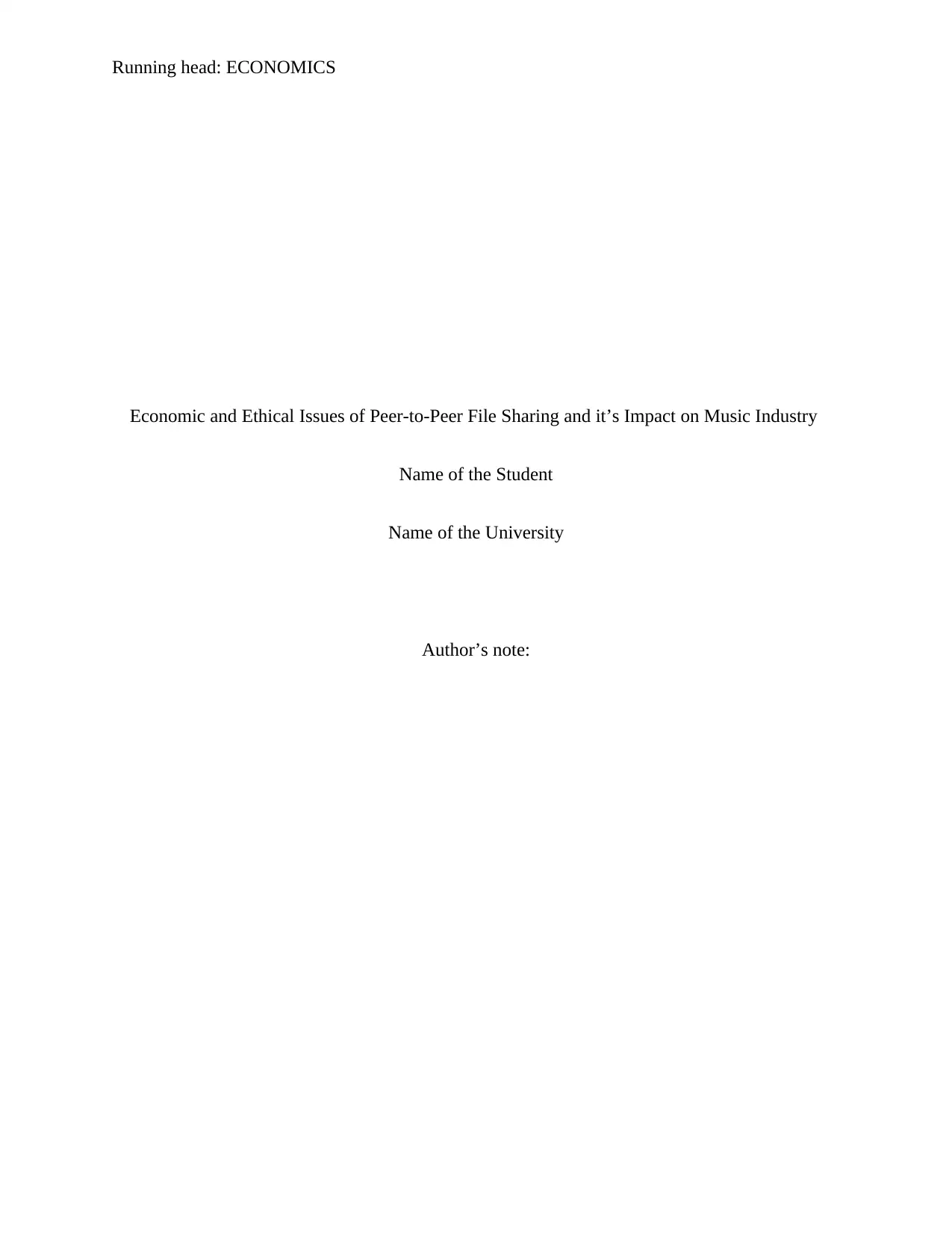
Running head: ECONOMICS
Economic and Ethical Issues of Peer-to-Peer File Sharing and it’s Impact on Music Industry
Name of the Student
Name of the University
Author’s note:
Economic and Ethical Issues of Peer-to-Peer File Sharing and it’s Impact on Music Industry
Name of the Student
Name of the University
Author’s note:
Paraphrase This Document
Need a fresh take? Get an instant paraphrase of this document with our AI Paraphraser
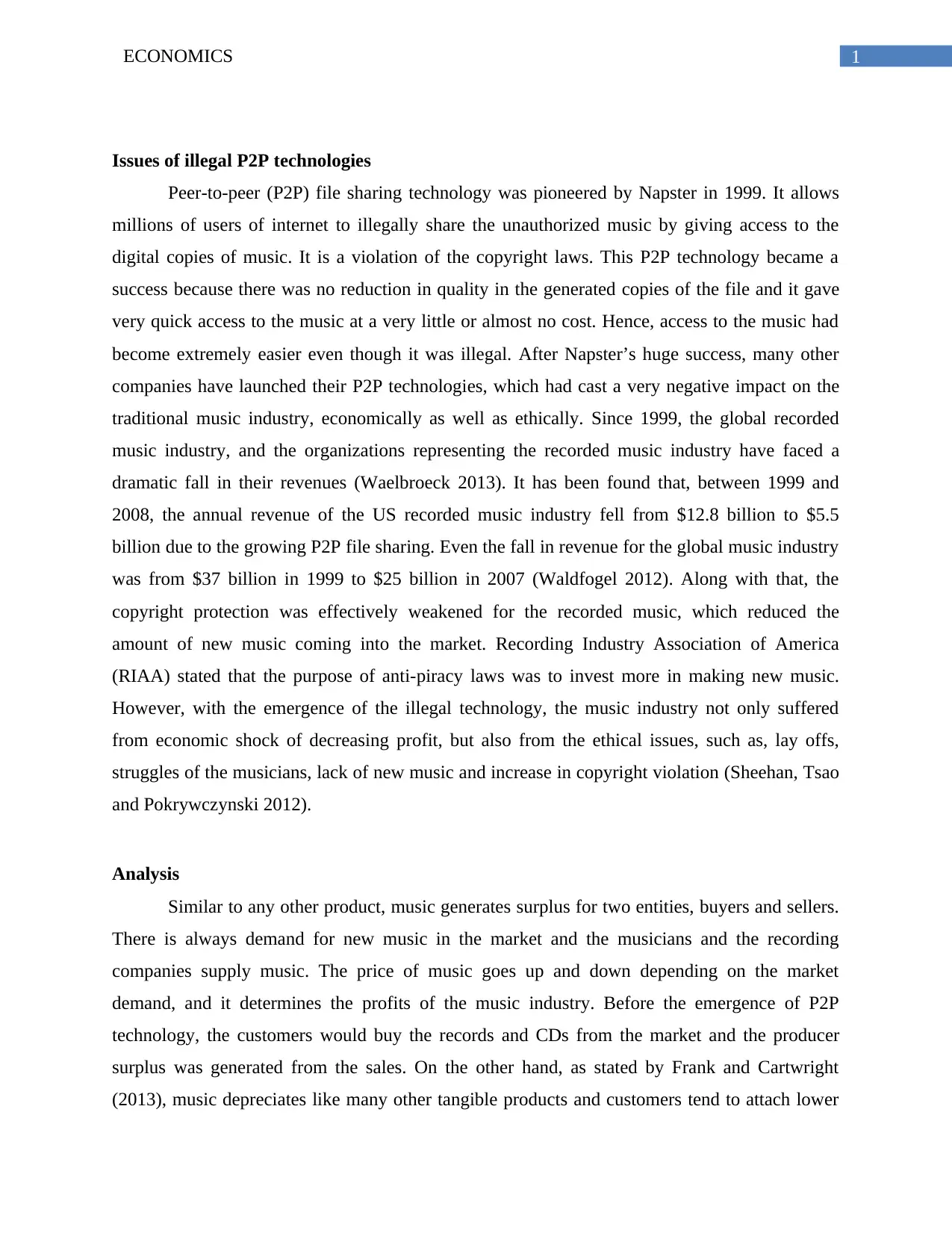
1ECONOMICS
Issues of illegal P2P technologies
Peer-to-peer (P2P) file sharing technology was pioneered by Napster in 1999. It allows
millions of users of internet to illegally share the unauthorized music by giving access to the
digital copies of music. It is a violation of the copyright laws. This P2P technology became a
success because there was no reduction in quality in the generated copies of the file and it gave
very quick access to the music at a very little or almost no cost. Hence, access to the music had
become extremely easier even though it was illegal. After Napster’s huge success, many other
companies have launched their P2P technologies, which had cast a very negative impact on the
traditional music industry, economically as well as ethically. Since 1999, the global recorded
music industry, and the organizations representing the recorded music industry have faced a
dramatic fall in their revenues (Waelbroeck 2013). It has been found that, between 1999 and
2008, the annual revenue of the US recorded music industry fell from $12.8 billion to $5.5
billion due to the growing P2P file sharing. Even the fall in revenue for the global music industry
was from $37 billion in 1999 to $25 billion in 2007 (Waldfogel 2012). Along with that, the
copyright protection was effectively weakened for the recorded music, which reduced the
amount of new music coming into the market. Recording Industry Association of America
(RIAA) stated that the purpose of anti-piracy laws was to invest more in making new music.
However, with the emergence of the illegal technology, the music industry not only suffered
from economic shock of decreasing profit, but also from the ethical issues, such as, lay offs,
struggles of the musicians, lack of new music and increase in copyright violation (Sheehan, Tsao
and Pokrywczynski 2012).
Analysis
Similar to any other product, music generates surplus for two entities, buyers and sellers.
There is always demand for new music in the market and the musicians and the recording
companies supply music. The price of music goes up and down depending on the market
demand, and it determines the profits of the music industry. Before the emergence of P2P
technology, the customers would buy the records and CDs from the market and the producer
surplus was generated from the sales. On the other hand, as stated by Frank and Cartwright
(2013), music depreciates like many other tangible products and customers tend to attach lower
Issues of illegal P2P technologies
Peer-to-peer (P2P) file sharing technology was pioneered by Napster in 1999. It allows
millions of users of internet to illegally share the unauthorized music by giving access to the
digital copies of music. It is a violation of the copyright laws. This P2P technology became a
success because there was no reduction in quality in the generated copies of the file and it gave
very quick access to the music at a very little or almost no cost. Hence, access to the music had
become extremely easier even though it was illegal. After Napster’s huge success, many other
companies have launched their P2P technologies, which had cast a very negative impact on the
traditional music industry, economically as well as ethically. Since 1999, the global recorded
music industry, and the organizations representing the recorded music industry have faced a
dramatic fall in their revenues (Waelbroeck 2013). It has been found that, between 1999 and
2008, the annual revenue of the US recorded music industry fell from $12.8 billion to $5.5
billion due to the growing P2P file sharing. Even the fall in revenue for the global music industry
was from $37 billion in 1999 to $25 billion in 2007 (Waldfogel 2012). Along with that, the
copyright protection was effectively weakened for the recorded music, which reduced the
amount of new music coming into the market. Recording Industry Association of America
(RIAA) stated that the purpose of anti-piracy laws was to invest more in making new music.
However, with the emergence of the illegal technology, the music industry not only suffered
from economic shock of decreasing profit, but also from the ethical issues, such as, lay offs,
struggles of the musicians, lack of new music and increase in copyright violation (Sheehan, Tsao
and Pokrywczynski 2012).
Analysis
Similar to any other product, music generates surplus for two entities, buyers and sellers.
There is always demand for new music in the market and the musicians and the recording
companies supply music. The price of music goes up and down depending on the market
demand, and it determines the profits of the music industry. Before the emergence of P2P
technology, the customers would buy the records and CDs from the market and the producer
surplus was generated from the sales. On the other hand, as stated by Frank and Cartwright
(2013), music depreciates like many other tangible products and customers tend to attach lower
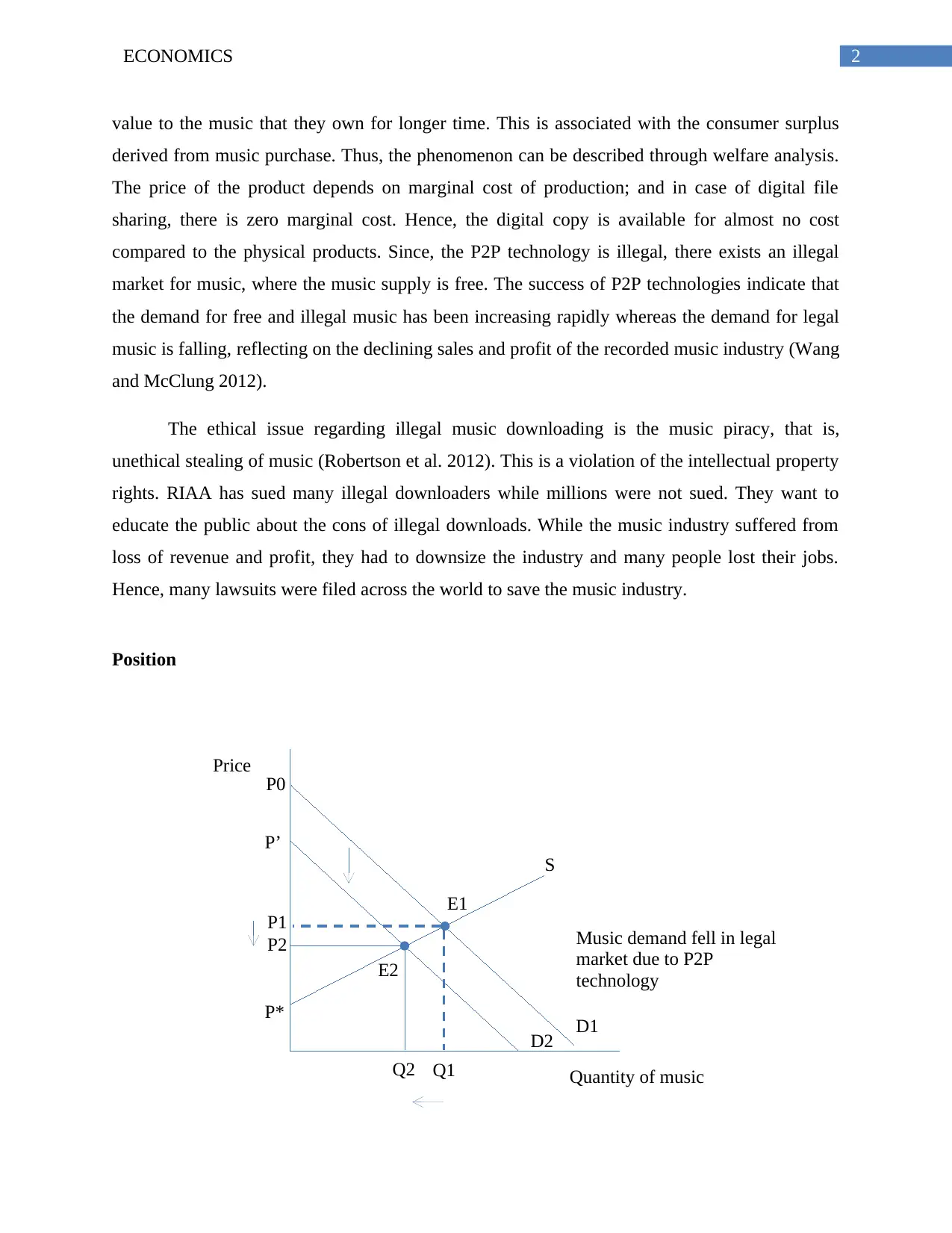
2ECONOMICS
Price
Quantity of music
S
P0
D2
P2
P1 E1
E2
Music demand fell in legal
market due to P2P
technology
Q1Q2
D1
P’
P*
value to the music that they own for longer time. This is associated with the consumer surplus
derived from music purchase. Thus, the phenomenon can be described through welfare analysis.
The price of the product depends on marginal cost of production; and in case of digital file
sharing, there is zero marginal cost. Hence, the digital copy is available for almost no cost
compared to the physical products. Since, the P2P technology is illegal, there exists an illegal
market for music, where the music supply is free. The success of P2P technologies indicate that
the demand for free and illegal music has been increasing rapidly whereas the demand for legal
music is falling, reflecting on the declining sales and profit of the recorded music industry (Wang
and McClung 2012).
The ethical issue regarding illegal music downloading is the music piracy, that is,
unethical stealing of music (Robertson et al. 2012). This is a violation of the intellectual property
rights. RIAA has sued many illegal downloaders while millions were not sued. They want to
educate the public about the cons of illegal downloads. While the music industry suffered from
loss of revenue and profit, they had to downsize the industry and many people lost their jobs.
Hence, many lawsuits were filed across the world to save the music industry.
Position
Price
Quantity of music
S
P0
D2
P2
P1 E1
E2
Music demand fell in legal
market due to P2P
technology
Q1Q2
D1
P’
P*
value to the music that they own for longer time. This is associated with the consumer surplus
derived from music purchase. Thus, the phenomenon can be described through welfare analysis.
The price of the product depends on marginal cost of production; and in case of digital file
sharing, there is zero marginal cost. Hence, the digital copy is available for almost no cost
compared to the physical products. Since, the P2P technology is illegal, there exists an illegal
market for music, where the music supply is free. The success of P2P technologies indicate that
the demand for free and illegal music has been increasing rapidly whereas the demand for legal
music is falling, reflecting on the declining sales and profit of the recorded music industry (Wang
and McClung 2012).
The ethical issue regarding illegal music downloading is the music piracy, that is,
unethical stealing of music (Robertson et al. 2012). This is a violation of the intellectual property
rights. RIAA has sued many illegal downloaders while millions were not sued. They want to
educate the public about the cons of illegal downloads. While the music industry suffered from
loss of revenue and profit, they had to downsize the industry and many people lost their jobs.
Hence, many lawsuits were filed across the world to save the music industry.
Position
⊘ This is a preview!⊘
Do you want full access?
Subscribe today to unlock all pages.

Trusted by 1+ million students worldwide
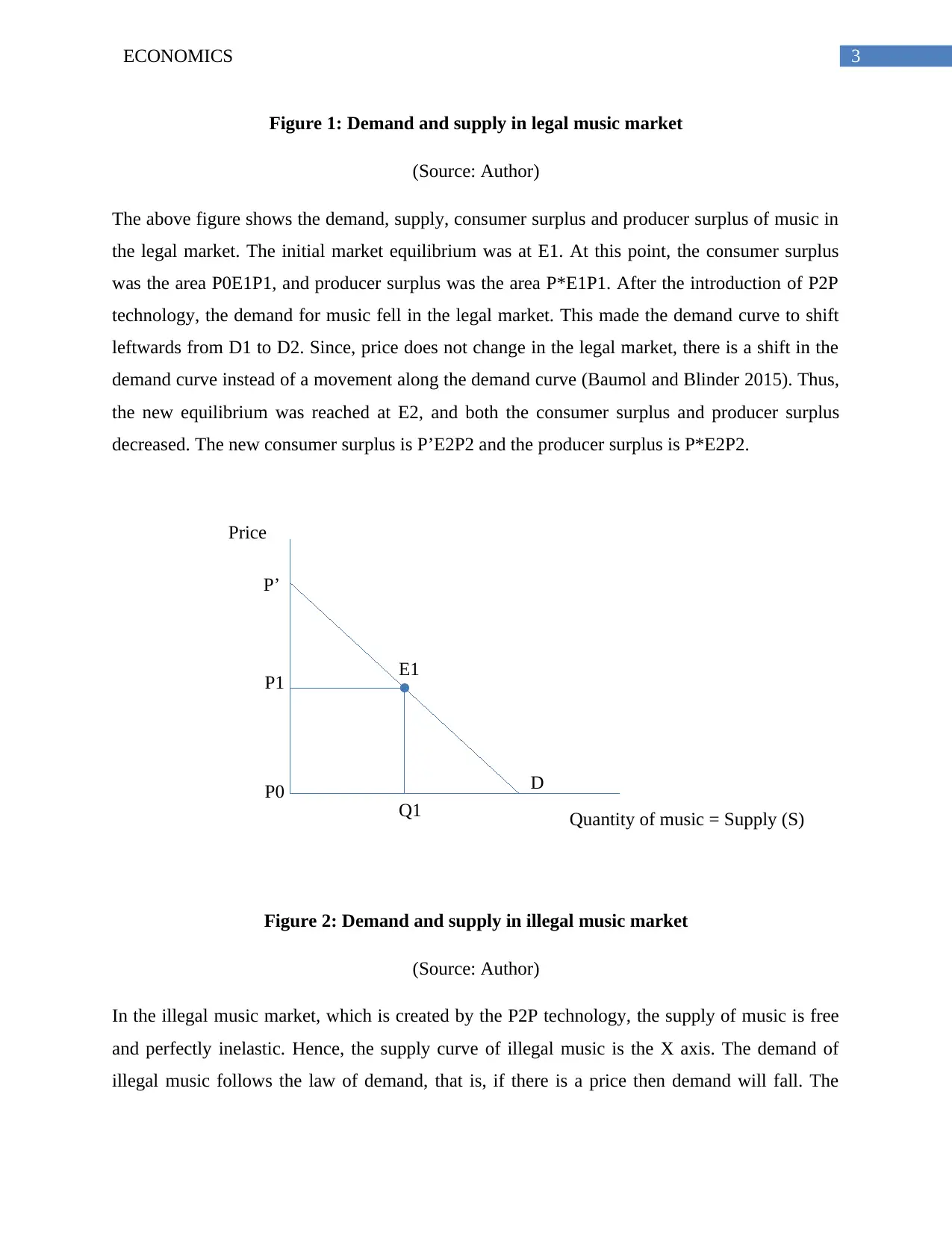
3ECONOMICS
Price
Quantity of music = Supply (S)
P’
D
P1
P0
E1
Q1
Figure 1: Demand and supply in legal music market
(Source: Author)
The above figure shows the demand, supply, consumer surplus and producer surplus of music in
the legal market. The initial market equilibrium was at E1. At this point, the consumer surplus
was the area P0E1P1, and producer surplus was the area P*E1P1. After the introduction of P2P
technology, the demand for music fell in the legal market. This made the demand curve to shift
leftwards from D1 to D2. Since, price does not change in the legal market, there is a shift in the
demand curve instead of a movement along the demand curve (Baumol and Blinder 2015). Thus,
the new equilibrium was reached at E2, and both the consumer surplus and producer surplus
decreased. The new consumer surplus is P’E2P2 and the producer surplus is P*E2P2.
Figure 2: Demand and supply in illegal music market
(Source: Author)
In the illegal music market, which is created by the P2P technology, the supply of music is free
and perfectly inelastic. Hence, the supply curve of illegal music is the X axis. The demand of
illegal music follows the law of demand, that is, if there is a price then demand will fall. The
Price
Quantity of music = Supply (S)
P’
D
P1
P0
E1
Q1
Figure 1: Demand and supply in legal music market
(Source: Author)
The above figure shows the demand, supply, consumer surplus and producer surplus of music in
the legal market. The initial market equilibrium was at E1. At this point, the consumer surplus
was the area P0E1P1, and producer surplus was the area P*E1P1. After the introduction of P2P
technology, the demand for music fell in the legal market. This made the demand curve to shift
leftwards from D1 to D2. Since, price does not change in the legal market, there is a shift in the
demand curve instead of a movement along the demand curve (Baumol and Blinder 2015). Thus,
the new equilibrium was reached at E2, and both the consumer surplus and producer surplus
decreased. The new consumer surplus is P’E2P2 and the producer surplus is P*E2P2.
Figure 2: Demand and supply in illegal music market
(Source: Author)
In the illegal music market, which is created by the P2P technology, the supply of music is free
and perfectly inelastic. Hence, the supply curve of illegal music is the X axis. The demand of
illegal music follows the law of demand, that is, if there is a price then demand will fall. The
Paraphrase This Document
Need a fresh take? Get an instant paraphrase of this document with our AI Paraphraser
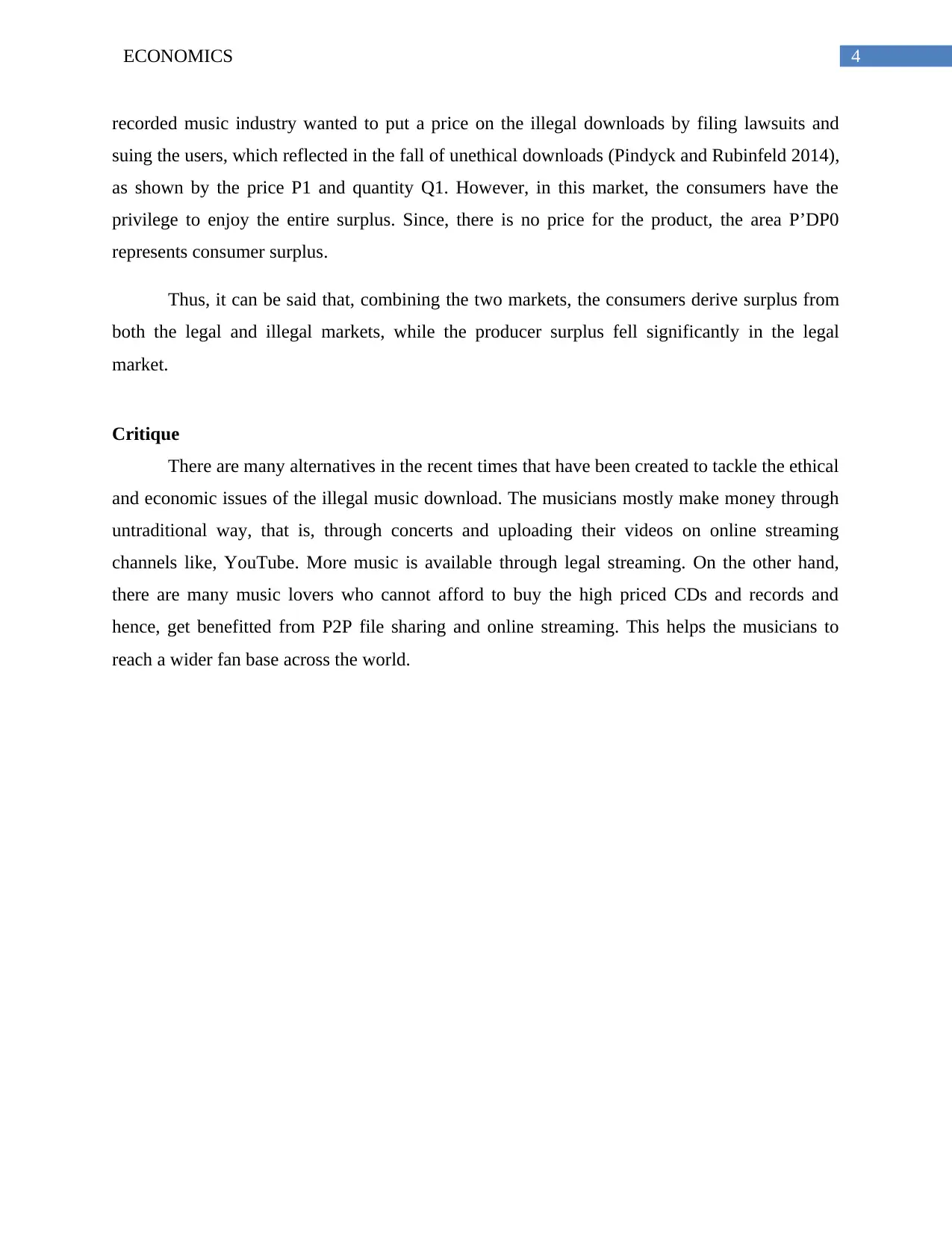
4ECONOMICS
recorded music industry wanted to put a price on the illegal downloads by filing lawsuits and
suing the users, which reflected in the fall of unethical downloads (Pindyck and Rubinfeld 2014),
as shown by the price P1 and quantity Q1. However, in this market, the consumers have the
privilege to enjoy the entire surplus. Since, there is no price for the product, the area P’DP0
represents consumer surplus.
Thus, it can be said that, combining the two markets, the consumers derive surplus from
both the legal and illegal markets, while the producer surplus fell significantly in the legal
market.
Critique
There are many alternatives in the recent times that have been created to tackle the ethical
and economic issues of the illegal music download. The musicians mostly make money through
untraditional way, that is, through concerts and uploading their videos on online streaming
channels like, YouTube. More music is available through legal streaming. On the other hand,
there are many music lovers who cannot afford to buy the high priced CDs and records and
hence, get benefitted from P2P file sharing and online streaming. This helps the musicians to
reach a wider fan base across the world.
recorded music industry wanted to put a price on the illegal downloads by filing lawsuits and
suing the users, which reflected in the fall of unethical downloads (Pindyck and Rubinfeld 2014),
as shown by the price P1 and quantity Q1. However, in this market, the consumers have the
privilege to enjoy the entire surplus. Since, there is no price for the product, the area P’DP0
represents consumer surplus.
Thus, it can be said that, combining the two markets, the consumers derive surplus from
both the legal and illegal markets, while the producer surplus fell significantly in the legal
market.
Critique
There are many alternatives in the recent times that have been created to tackle the ethical
and economic issues of the illegal music download. The musicians mostly make money through
untraditional way, that is, through concerts and uploading their videos on online streaming
channels like, YouTube. More music is available through legal streaming. On the other hand,
there are many music lovers who cannot afford to buy the high priced CDs and records and
hence, get benefitted from P2P file sharing and online streaming. This helps the musicians to
reach a wider fan base across the world.
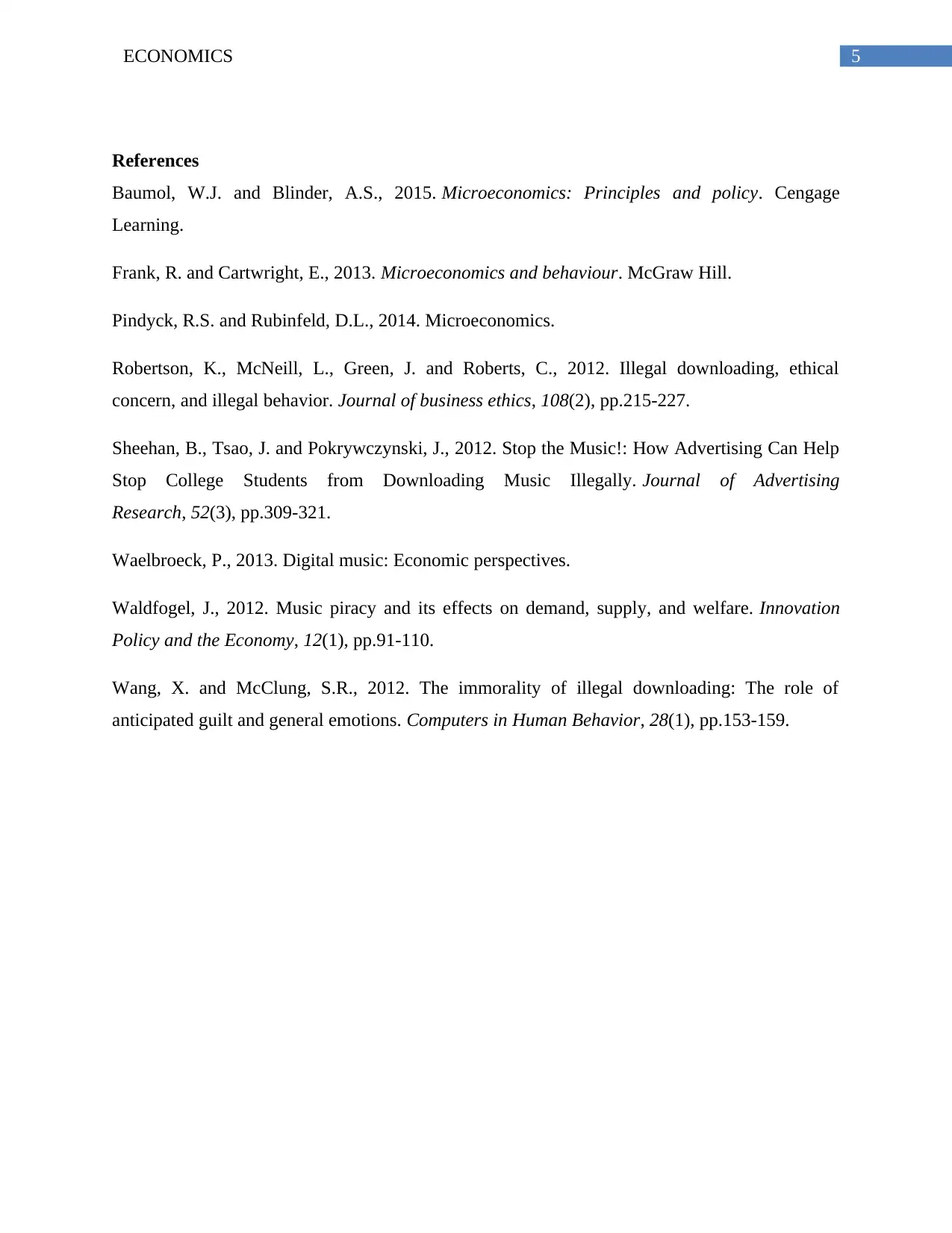
5ECONOMICS
References
Baumol, W.J. and Blinder, A.S., 2015. Microeconomics: Principles and policy. Cengage
Learning.
Frank, R. and Cartwright, E., 2013. Microeconomics and behaviour. McGraw Hill.
Pindyck, R.S. and Rubinfeld, D.L., 2014. Microeconomics.
Robertson, K., McNeill, L., Green, J. and Roberts, C., 2012. Illegal downloading, ethical
concern, and illegal behavior. Journal of business ethics, 108(2), pp.215-227.
Sheehan, B., Tsao, J. and Pokrywczynski, J., 2012. Stop the Music!: How Advertising Can Help
Stop College Students from Downloading Music Illegally. Journal of Advertising
Research, 52(3), pp.309-321.
Waelbroeck, P., 2013. Digital music: Economic perspectives.
Waldfogel, J., 2012. Music piracy and its effects on demand, supply, and welfare. Innovation
Policy and the Economy, 12(1), pp.91-110.
Wang, X. and McClung, S.R., 2012. The immorality of illegal downloading: The role of
anticipated guilt and general emotions. Computers in Human Behavior, 28(1), pp.153-159.
References
Baumol, W.J. and Blinder, A.S., 2015. Microeconomics: Principles and policy. Cengage
Learning.
Frank, R. and Cartwright, E., 2013. Microeconomics and behaviour. McGraw Hill.
Pindyck, R.S. and Rubinfeld, D.L., 2014. Microeconomics.
Robertson, K., McNeill, L., Green, J. and Roberts, C., 2012. Illegal downloading, ethical
concern, and illegal behavior. Journal of business ethics, 108(2), pp.215-227.
Sheehan, B., Tsao, J. and Pokrywczynski, J., 2012. Stop the Music!: How Advertising Can Help
Stop College Students from Downloading Music Illegally. Journal of Advertising
Research, 52(3), pp.309-321.
Waelbroeck, P., 2013. Digital music: Economic perspectives.
Waldfogel, J., 2012. Music piracy and its effects on demand, supply, and welfare. Innovation
Policy and the Economy, 12(1), pp.91-110.
Wang, X. and McClung, S.R., 2012. The immorality of illegal downloading: The role of
anticipated guilt and general emotions. Computers in Human Behavior, 28(1), pp.153-159.
⊘ This is a preview!⊘
Do you want full access?
Subscribe today to unlock all pages.

Trusted by 1+ million students worldwide
1 out of 6
Related Documents
Your All-in-One AI-Powered Toolkit for Academic Success.
+13062052269
info@desklib.com
Available 24*7 on WhatsApp / Email
![[object Object]](/_next/static/media/star-bottom.7253800d.svg)
Unlock your academic potential
Copyright © 2020–2026 A2Z Services. All Rights Reserved. Developed and managed by ZUCOL.





